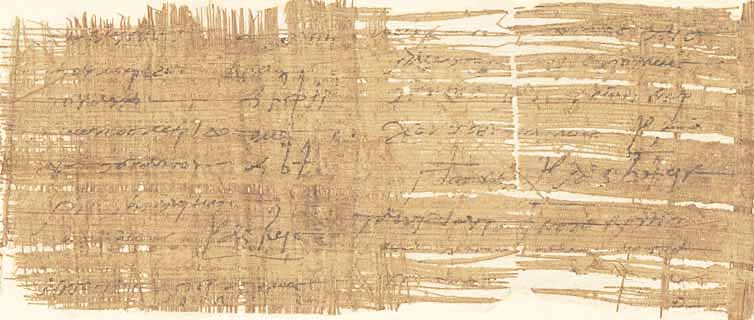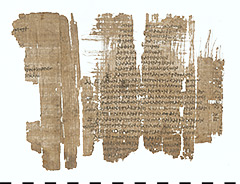BKT V.2, S. 64–72 (P. 9908 R)
Going to Troy without a GPS? In ancient times a son of Heracles was used for this purpose – Telephus. He led the Greeks to Troy, where it took them ten long years to defeat the defenders of the city. The poet Euripides used this material in a tragedy of which a few lines have survived on this papyrus.
The papyrus was acquired by Otto Rubensohn in 1903 for the Berlin Papyrus Collection. It is only a part of a formerly large papyrus scroll. On the back are the remains of an astrological manual. Remains of the tragedy of Euripides can still be seen on the front of this scroll in three columns. While there are only a few remains of columns I and III, more than the upper half of the second column is preserved. Interestingly, this fragment was initially attributed to another tragedy, namely The Gathering of the Achaeans of Sophocles. Only after finding further fragments of the tragedy „Telephus“ was it possible to assign it to this tragedy of Euripides. Based on the writing, the papyrus can be dated to the 2nd century AD.
Telephus is a son of Heracles and Auge, the daughter of King Aleus of Tegea. As king of Mysia, he fought the Greeks who accidentally attacked Mysia on their way to Troy. He defeated them but was wounded by Achilles with his spear. Since his wound did not heal and, according to an oracle, could only be healed by the one who inflicted it, he went to Argos disguised as a beggar. There the Greeks had gathered for the war against Troy. Here he hoped to meet Achilles to heal his wound. Since this was not successful, he robbed Orestes, the little son of Agamemnon, from his cradle and threatened to kill the child. The clever and cunning Odysseus came up with the idea that the spear could cure him. Scraped rust from the spear, placed in the wound, healed Telephus. An oracle appointed him as leader of the Greeks to Troy. Telephus showed the Greeks the way there, but did not take part in the war. He later founded the city of Pergamon and can be seen on the famous Pergamon Altar.
From this myth, Euripides uses individual parts for his tragedy „Telephus“, which was first performed in Athens in 438 BC. Along with Aeschylus and Sophocles, Euripides is the youngest of the three great tragedian poets of classical Greece. Most of his dramas have not survived. Of many, only a few quotations from other ancient authors and on scraps of papyrus and parchment have survived. This also applies to the tragedy „Telephus“. Some quotations of this are preserved, especially by the poet Aristophanes, who satirizes the tragedy „Telephus“ in his comedy „The Acharnians“. Among the fragments handed down on papyrus, the piece presented here is one of the most important testimonies.
The text on this papyrus begins with a choral song, in which the cheers of the Greeks about the prospect of a soon and safe journey to Troy become clear. The chorus assumes that the journey to Troy, demanded by favorable winds, will be happy and without further delay. Telephus, who will guide them, will make sure of this. Because he is a Greek from Tegea and, according to divine will, destined to be the leader of the Greeks – so the choir praises him. Immediately Achilles appears and begins a conversation with Odysseus. Achilles has no knowledge of what has happened so far, and is surprised and annoyed by the alleged inactivity and senseless debating addiction of the others. Odysseus, however, tries to calm him down.
In addition to the tradition of a larger coherent text piece of this tragedy, this papyrus also contains another interesting detail. On this fragment there are preserved references to speakers. In the second column, for example, by naming Achilles and Odysseus in front of the individual lines, it is clearly visible who is currently speaking and when the speaker changes. From the third column, it is these speaker notes in particular that have been preserved. They clearly show that the conversation between Achilles and Odysseus is continuing.



